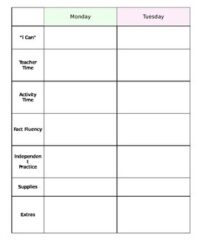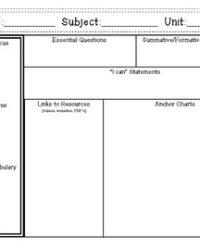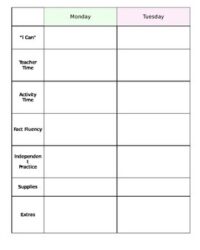Diving into the world of reading workshops can be incredibly rewarding for both teachers and students. It’s a dynamic approach that fosters independent reading, critical thinking, and a genuine love for books. But as any educator knows, bringing this vision to life effectively requires thoughtful preparation and a clear roadmap. That’s where a solid reading workshop lesson plan template comes into its own, providing the structure you need to deliver engaging and impactful lessons.
Imagine walking into your classroom feeling perfectly prepared, knowing exactly how each segment of your reading block will unfold. A well-designed template isn’t just about ticking boxes; it’s about ensuring every minute is purposeful, from the mini-lesson to independent reading and conferencing. It helps you articulate your learning objectives, select appropriate texts, plan for differentiated instruction, and assess student progress seamlessly. Let’s explore how such a template can transform your literacy block.
The Core Components of an Effective Reading Workshop Lesson Plan Template
Crafting a successful reading workshop isn’t just about putting books in kids’ hands; it’s about meticulously planning the instructional journey. A robust reading workshop lesson plan template acts as your navigational chart, guiding you through the essential elements that make these sessions so powerful. It ensures consistency, allows for reflection, and ultimately, helps you meet the diverse needs of your learners. Let’s break down the key parts you’ll want to include in your own template to ensure every lesson hits its mark and truly resonates with your students.
Mini-Lesson Focus
The mini-lesson is the heart of the reading workshop, a concise, focused burst of instruction designed to teach a specific reading strategy or skill. Your template should dedicate a clear section to outlining this component. Think about what you want students to learn and how you’ll model it effectively. This isn’t the time for a long lecture; it’s about targeted teaching that students can immediately apply to their own reading. What essential question will guide this short lesson? How will you make it stick?
Independent Reading and Conferencing
Following the mini-lesson, students transition into independent reading, applying the strategy they just learned. This is where the real magic happens, as students engage deeply with texts of their choice. Your template needs space to plan for this crucial period, including how you’ll facilitate it and, importantly, how you’ll conduct individual conferences. Conferencing is your opportunity to connect with students one-on-one, provide personalized feedback, and set goals. Consider these points:
- How will students select their “just right” books?
- What will be the quiet reading expectations?
- What are your conferencing goals for specific students?
- How will you track progress during conferences?
- What prompts will you use to encourage deeper thinking?
This segment isn’t just about quiet reading; it’s about active application of skills and responsive teaching through personalized interactions. A good template will help you organize your thoughts for these invaluable moments.
Share Time and Reflection
The workshop typically concludes with a share time, where students come back together to discuss their reading, share discoveries, and reflect on the day’s lesson. This builds a community of readers and reinforces learning. Your template should include a section for planning this wrap-up. What strategies will you use to facilitate meaningful sharing? Will students share in pairs, small groups, or with the whole class? How will you encourage them to articulate their thinking and listen to their peers?
Reflection is a powerful tool for metacognition. Consider how students will reflect on their learning from the mini-lesson and their independent reading. This could be through quick writes, journaling, or a brief discussion, solidifying their understanding and helping them connect new strategies to their ongoing reading journey.
Customizing Your Reading Workshop Lesson Plan Template for Your Classroom
While a general reading workshop lesson plan template provides a fantastic foundation, the real power comes from adapting it to fit your unique classroom context. Every group of students is different, with varying needs, interests, and reading levels. A truly effective template isn’t a rigid blueprint but a flexible framework that allows you to infuse your personality and respond to the evolving dynamics of your learners. Thinking about your specific students will help you make the template truly work for you, rather than feeling like a chore.
Consider the age and developmental stage of your students. A template for kindergarteners will look quite different from one for middle schoolers, even though the core workshop structure remains similar. Think about the types of texts your students are engaging with – fiction, non-fiction, poetry, digital media. Your template should encourage you to plan for diverse text types and how you’ll guide students through them. Furthermore, how will you incorporate technology to enhance the reading experience or streamline your planning process?
Don’t be afraid to experiment with your template over time. As you use it, you’ll discover what works best and what might need tweaking. Here are some elements you might consider adding or modifying:
- Sections for specific differentiation strategies for struggling or advanced readers.
- Space for integrating technology tools or digital resources.
- Prompts for cross-curricular connections if relevant to your unit.
- A dedicated area for formative assessment notes or anecdotal records.
- A section to note specific “mentor texts” that exemplify the teaching point.
- Checklists for materials needed for each lesson.
The goal is to create a template that serves as your trusted companion, not a restrictive binder. It should simplify your planning, enhance your teaching, and ultimately, make your reading workshop the most vibrant and effective part of your day.
Implementing a well-structured reading workshop can genuinely transform your literacy instruction, fostering not just reading skills but a deep, lasting love for books. It empowers students to become independent, strategic readers who are confident in their abilities and engaged with their learning. By utilizing a thoughtfully designed reading workshop lesson plan template, you’re not just organizing your thoughts; you’re proactively shaping a rich and responsive learning environment where every student can thrive.
This systematic approach provides clarity, ensures consistent implementation of best practices, and allows you to respond effectively to individual student needs. It frees up your mental energy to focus on the nuances of teaching and the joy of watching young readers grow. Embrace the power of planning, and watch your reading workshop flourish into a truly dynamic and impactful experience for everyone in your classroom.


